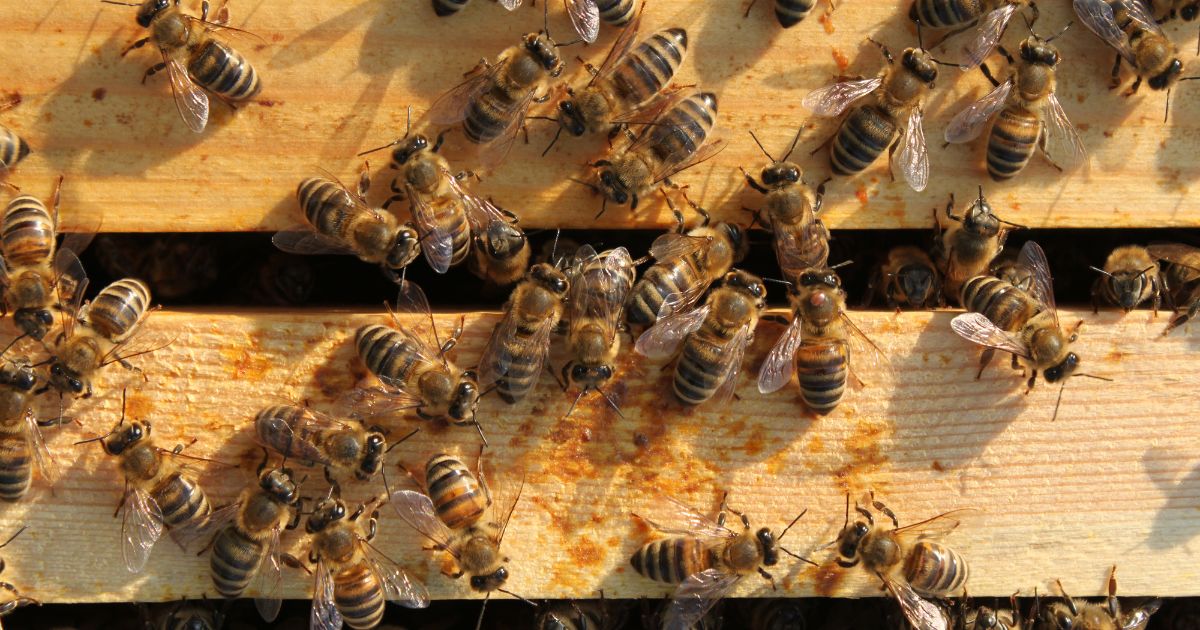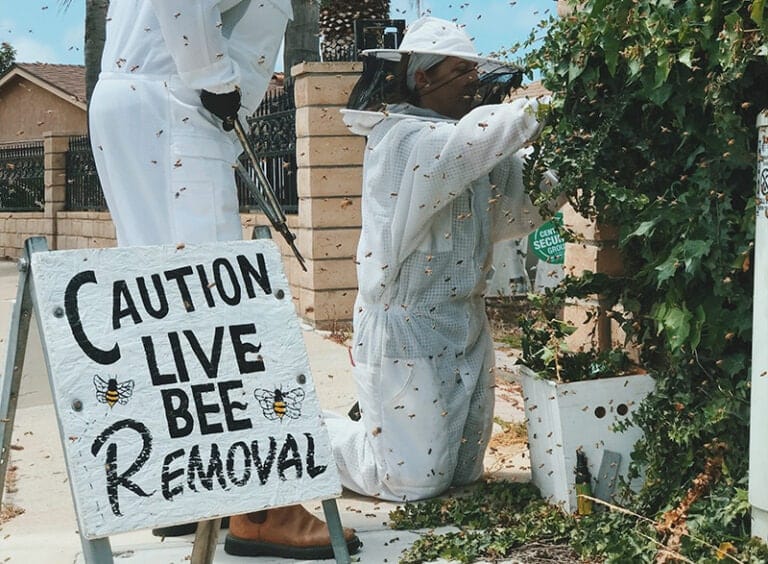Nucleus Hive Instruction Sheet
Purchased a nucleus hive? Please read these instructions carefully to ensure your bees have a safe and comfortable transition to their new home.

Nucleus Hive Care Sheet
Below are the important things you need to know about your new nucleus hive. Understanding these points will help save both you and the bees, from lots of stress.
Transporting Your Bees
When transporting the nucleus hive, it is best to do so on the floor of your vehicle, preventing the hive from moving around and potentially getting squashed and damaged.
Inside the hive, there are a lot of bees producing their own metabolic heat, so it’s important that the hive is kept cool and NOT left in a hot car, even for a short period of time. The vents on either side of the hive will aid in oxygen transfer, so be careful to keep these uncovered so fresh air can be let in.
For added safety, I use duct tape to keep the lid in place and there are also clips on the ends of the lid to help keep everything secure.
Positioning Your Hive
When you get to your destination with the bees, put the hive in a position where it can stay permanently. If you have a bigger hive, move it away, as it’s not required at this stage. I recommend that you wear a protective suit with gloves as the bees will be somewhat disgruntled after their journey.
Open the hive straight away within five minutes of getting to your destination, and rotate the entrance disc, so the large hole is directly at the bottom. Note that bees will rapidly come out of the hive, so be prepared to move away quickly, depending on the weather.
This location is where the bees need to stay; they cannot be moved, as moving them less than 2km away will mean that they are likely to get lost. So chose the location very carefully!
Please note: a position with the entrance facing east or north is best. Depending on the weather, the bees will be slightly agitated as they need to orient themselves to work out where they are and their new hive placement. During this time, I recommend you don’t go near the hive for a day or so.
Let Your Bees Settle In
It is important that you don’t transfer the bees straight away when you get home. Let them settle for a minimum of 10 days.
Transferring Your Bees
Once your bees have settled in for a minimum of 10 days, choose the right day to transfer your colony. Wait until around midday when it’s nice and sunny with no weather changes due to occur for the rest of the day – a sunny day between 20°–30°C and not cloudy is an ideal choice. It’s now time to transfer your bees.
Give a gentle puff of smoke at the entrance – don’t use too much smoke as it’s not needed – then lift the lid. The lid might take a bit of force to open; jiggle the lid carefully if needed to open the lid.
Give two small gentle puffs of smoke across the top of the frames then leave for 30 seconds. You can then gently transfer each frame, one by one, into your bigger hive. Put the frames with the bees in the middle of the bigger hive and the new frames on the outside.
Be careful not to squash any bees – once the frames are in you can then tip any remaining bees in front of the hive at the entrance. Make sure you take away the nuc box as the bees may be attracted to it; move it 5 metres away so any remaining bees will fly back to the colony, but check the queen is not in the box!
It will take an hour or so and the bees will then settle into their new hive. Store the empty nucleus box in the garage as it’s perfect for collecting a swarm or doing a split!
Finding Your Queen
Trust me, the queen is in there! But you might not find her if you’re doing this for the first time.
How Long Do I Have to Transfer My Colony to a Larger Hive?
You have plenty of time to transfer the bees into a bigger hive, ideally less than 3 weeks as once in a bigger hive the colony can expand and grow.
I’ve made a video on my website on how to do this: click on the 5-frame nucleus hive on my online store and scroll down – it will guide you on how to carry out the transfer, but remember, wear your beekeeping protective clothing!
Leave Your Bees Alone at Nighttime
It’s important that you do not open your hive at nighttime. Weather permitting, this includes 2 hours after dawn and 2 hours before dusk!
Feeding Your Bees
If you want to really get your bees off to a flying start, you can feed the bees a sugar syrup, which is one part sugar and one part water. This helps the colony draw wax and the queen lay more eggs; however, this extra feed is not required in spring.
There are feeder ideas on the internet, but you can simply use a zip-lock bag. Depending on the flora in your area, keep an eye on the hive as you will need to put another box on top to allow for colony expansion. Also, make sure that the bees don’t starve, as some areas have limited nectar sources and you may have to feed them a two-part sugar syrup solution or fondant that I make and sell.
Regular Inspections of Your Bee Colony
You will need to do regular inspections every 2–3 weeks to see how your bees progressing – just don’t think that because you have bees, they will be fine, as it can be like keeping sheep in the desert!
Depending on the weather and what’s in flower, they should start working on the outside frames. If you have questions, I am happy to help, but I would like to see photos as I need to see what you see.
Feeling the weight by gently lifting the back of the hive will give you a good indication of how much honey is getting stored. This is important in autumn as I often encounter beekeepers whose colonies have starved over winter and this can be EASILY avoided. I sell bee food on my website if required.
Questions? Ask Ben!
If you have any questions, please don’t hesitate to call me; if I don’t answer, send me a text, and I will call you back as soon as I can. You can also shoot me a message via the Ben’s Bees contact form.
As I mentioned, taking some photos of your beekeeping issue is a great way to help me understand the problem and find a solution. Springtime is a hectic time for all beekeepers, so if you text me and I have not responded within five hours, send the message again as I might miss it due to being in a non-reception, regional area.
Enjoy the new hive and your colony of bees!
I look forward to hearing how your new pets go in the future
Ben Moore
0437077792


